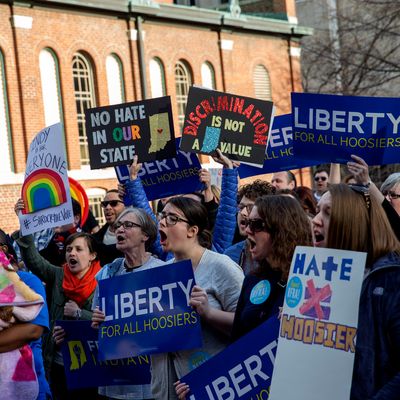
Since Indiana’s Religious Freedom Restoration Act (RFRA) was signed into law last week, lawmakers have insisted it’s not about letting business owners discriminate against gay and lesbian people (it’s just a coincidence that the law was enacted shortly after Indiana’s gay-marriage ban was overturned, and with a Supreme Court decision looming). But with few buying that explanation, on Monday Republican state lawmakers bowed to the growing opposition. At a press conference, House Speaker Bosma and Indiana Senate president pro tem David Long said the legislature will try to make it clear that the RFRA doesn’t do the thing it was almost certainly intended to do. “To the extent that we need to clarify through legislative action that this law does not and will not be allowed to discriminate against anyone, we will do just that,” Long said.
On Monday night, Governor Mike Pence was playing defense, too, noting in a Wall Street Journal op-ed that “Historically, this law has received wide bipartisan support.” It’s true that Indiana’s RFRA is based on federal legislation signed into law by Bill Clinton, and 19 states have similar laws. However, as The Atlantic explains, Indiana’s RFRA is significantly different from most other legislation because it applies to legal disputes between individuals, even if the government is not involved, and it explicitly states that for-profit businesses have a right to “the free exercise of religion.”
But the main reason Indiana’s law is drawing so much scrutiny is probably timing. As the Washington Post notes, “the 19 other laws were largely passed well before the recent and dramatic swing toward support for gay marriage — and after a similar bill was vetoed by the Republican governor of Arizona.” The lawsuit that sparked the 1993 federal law involved Native Americans who were fired for taking peyote during a religious ritual, and for years religious-freedom laws were thought of as a way to protect minority religions from government intrusion — not a way to sanction resistance to expanded LGBT rights.
The Indiana law comes at a time when support for gay rights is widespread and large corporations are more vocal about opposing discrimination. Plenty of state laws are blasted by political groups and mocked by celebrities on Twitter, but what put Indiana lawmakers under real pressure was opposition from business leaders. The NCAA, which is holding the Final Four in Indianapolis, and the cloud computing company Salesforce were among the first to voice concerns about RFRA. Then the CEOs of Apple, Anthem Inc., Dow AgroSciences, Yelp, and several other companies publicly criticized the law. Others are boycotting the state, including the American Federation of State, County and Municipal Employees, which pulled its upcoming conference from Indianapolis, and the band Wilco, which canceled an upcoming show in Indianapolis.
With the state already seeing economic consequences, even some Republican officials have turned against the measure. “Our city thrives because we have welcomed and embraced diversity,” Indianapolis mayor Greg Ballard said on Monday. “And RFRA threatens what thousands of people have spent decades building.” He added, “Discrimination is wrong. And I hope that message is being heard loud and clear at our Statehouse.”
So while Indiana legislators hoped to quietly enact a law that reassures those who oppose marriage equality, instead on Tuesday they’ll see this on the cover of the Indianapolis Star:
“Only bold action — action that sends an unmistakable message to the world that our state will not tolerate discrimination against any of its citizens — will be enough to reverse the damage,” reads the rare front-page editorial. “Gov. Mike Pence and the General Assembly need to enact a state law to prohibit discrimination in employment, housing, education and public accommodations on the basis of a person’s sexual orientation or gender identity.”
Of course, proponents of RFRA have succeeded, as the law is now on the books and there’s no guarantee that “clarifying” it will involve adding sexual orientation and gender identity to Indiana’s civil-rights protections. But RFRA has also mobilized powerful opponents of LGBT discrimination, and the national outcry may prevent similar laws from being enacted in other states. The controversy has prompted lawmakers in Georgia, North Carolina, and Arkansas to consider limiting or rejecting similar measures under consideration. In a radio interview, North Carolina governor Pat McCrory, a Republican, said he thinks passing a religious-freedom bill would “make no sense.” “What is the problem they’re trying to solve?” he asked.






























